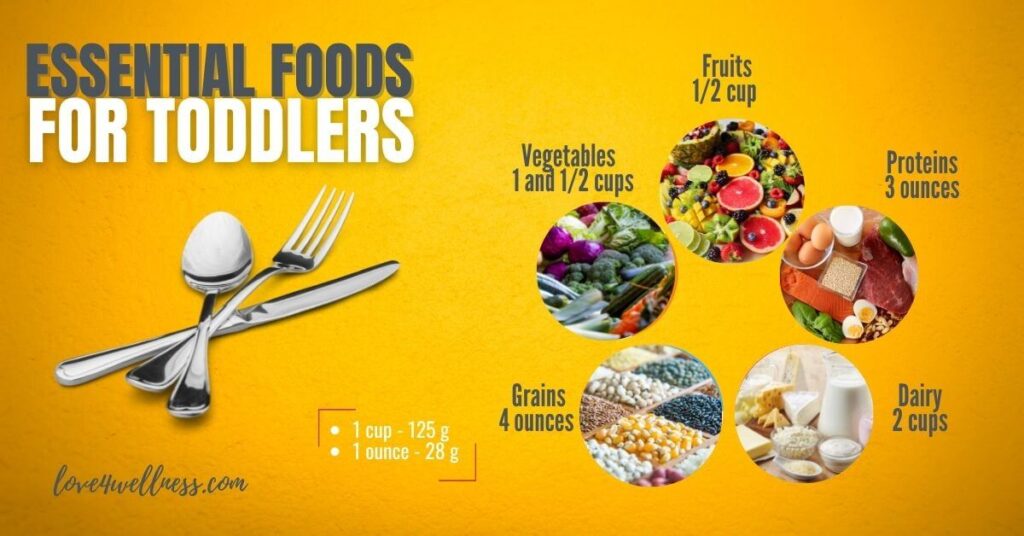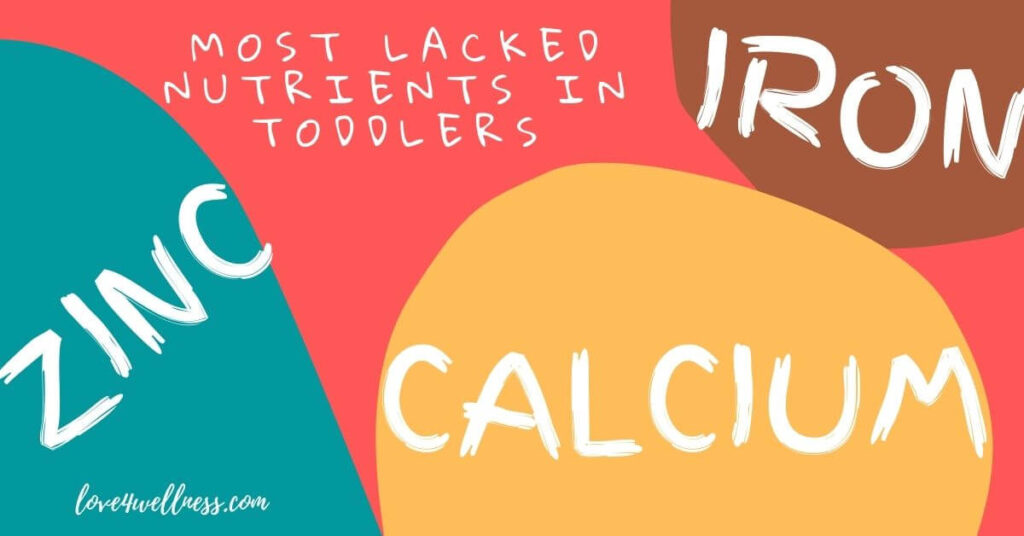Toddlers between the ages of one to three years tend to be more independent and explore. This stage is characterised by a rapid increase in gross and fine motor skills. And this is when they develop new food skills and eating habits. Though they start to self-regulate food intake, parents and caregivers play a major role in children’s eating and other lifestyle behaviours. This article briefly explains the dietary needs of a toddler and how parents can ensure adequate nutrition in their child.
Toddler nutrition – foods to include
Just as adults, children also need the same basic nutrients – vitamins, minerals, protein, carbohydrates, and fats. Therefore toddlers’ diet needs to have a variety of fruits, vegetables, grains, protein foods, and dairy products to ensure required nutrition. Avoid foods and beverages with added sugars and high sodium content, and choose healthier options with various flavours, textures, and colours.

To build healthy bodies, toddlers need to consume
- 1 cup of fruits
- 1&1/2 cup of varied veggies
- 4 ounces of grains (focus on whole grains)
- 3 ounces of protein (make sure to include different protein sources such as seafood, beans, peas, meat, poultry, lentils, nuts and eggs)
- 2 cups of dairy products (milk, yogurt, cheese, etc.)
Also Read: Four Myths On Fruits Debunked And Six Benefits Of Fruits
Importance of fibre in toddler diet
Fibres are necessary for kids to prevent constipation. They help food move along the digestive tract and normalise bowel movements. Besides, regular consumption of fibre reduces the risk of heart diseases, type 2 diabetes, obesity and certain cancers in adulthood.
To increase fibre intake and reach your toddler nutrition needs (19g/day), you should add more veggies and fruits to your toddler plates in a creative way.
Do not forget fats
Toddlers are super-active, and an appropriate amount of fats is necessary to meet their needs for calories. Full-fat dairy, nuts and seeds, and avocados are great sources of fats.
Besides, including essential fatty acids and fat-soluble vitamins in your toddler diet is important for various physiological functions such as immune function, bone health, vision, and coagulation.

Most lacked nutrients in toddlers and diet tips to improve absorption
Most toddlers meet their dietary needs of most nutrients except for iron, zinc, and calcium.

Improve iron intake
To increase your child’s iron intake to meet their recommended intake (7 mg/day), you can add meat, poultry, fish, enriched grains, beans, tofu, green leafy vegetables, and iron-fortified cereals.
Also, adding vitamin C rich foods such as tomatoes, broccoli, oranges and strawberries to iron-rich foods will help iron to be better absorbed.
Further, it would help if the child’s cow’s milk intake is limited to 2 cups as calcium can hinder iron absorption. So, a child consuming too much calcium might become iron-deficient.
Increase Zinc absorption
Toddlers should consume more beans, nuts, seafood, whole grains, and fortified cereals to meet their recommended dietary needs of 3 mg/day.
Improve calcium intake
Around 21% of children in the age group 2-8 years consume less than their DRI (700 mg/day) of calcium. Calcium is important for bone health, and it is crucial to take adequate amounts.
Good sources of calcium include dairy products, sardines, and dark green leafy vegetables.
Note: You can include enriched grains and fortified cereals if your child is vitamin or mineral deficient.
Also Read: One Cup Yogurt A Day Can Also Keep Your Doctor Away!
Do not force-feed – It can have bad consequences

One of the common mistakes parents makes is force-feeding the child. You may be anxious about your toddler not getting enough nutrition, especially picky eaters.
However, force-feeding may lead to eating disorders, disruptive eating patterns, losing control of eating habits, inclining towards sugary or junk food, destructing your child natural appetite, and creating stressful mealtimes.
So, you must be patient in building good eating habits in your child.
Reduced appetite, is it a problem?
No, not always.
Does your child seem to show lesser interest in food and have a decreased appetite just after the first birthday?. Don’t worry. It is completely normal. This is because growth slows down after the first year, and it may seem to you that your child’s appetite has reduced.
In addition, the child develops strong food preferences and dislikes. Therefore, parents should try and establish healthy eating habits, including portion sizes and choices of foods. Habits formed at this age help the child live healthy throughout its adulthood.
Portion size
An appropriate serving size for children 2 to 3 years of age is about one-half of an adult serving size. Most parents tend to overestimate portion size and feed the child more than required, which might cause obesity.
More tips to parents to ensure the dietary needs of their toddlers
- Nutritional deficiencies may cause dental caries, iron deficiency anaemia, and constipation. So, be sure to consult your doctor when such an issue arises.
- Parents should limit carbonated soft drinks and juices as they just fill up empty calories. Always encourage your child to drink water when feeling thirsty.
- Excessive intake of some fish may cause mercury poisoning. So, be sure about portion sizes.
- Young children, when exposed to lead-based paint or lead-contaminated dust, may show symptoms such as loss of appetite, weight loss, abdominal pain, and vomiting. Lead poisoning can lead to serious health problems. Hence you must visit a doctor about such symptoms.
A final word
The early years of a child involve several milestones, and ensuring enough nutrition is crucial. While knowing what foods to give and how much to give is essential, it is equally critical not to force-feed the child. Instead, be creative and let the meal times be fun for you and your child.
